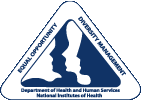Filing
an EEO Complaint
EEO Counseling
and ADR
Frequently Asked Questions
Regulations and Guidance
No FEAR Act Data
DCMR Resources
About DCMR
Contact DCMR |
WITNESS PARTICIPATION IN COMPLAINT PROCESSING
-
A complaint of discrimination has been filed against the Department of Health and Human Services (DHHS - hereinafter referred to as the "Agency") wherein you have been named as a witness.
-
The purpose of the administrative proceeding of discrimination complaint is to determine whether the alleged discrimination occurred so that appropriate remedial action can be taken, if warranted. When a complaint is filed, the complaint is filed against the head of the Agency who is the defendant in the complaint. Your role in the complaint process is simply that of a witness.
-
The individual filing the complaint of discrimination is referred to as the "complainant" during the formal process. When the complaint is accepted for investigation, an investigator, who is a contractor assigned by the Program Support Center (PSC), may contact you and inform you of the nature of an investigator's inquiry and your role in the process. The investigator will inform you of the nature of any claims that pertain to you. You will be given a fair opportunity to respond to the questions and state the facts as you understand them. You have the right to seek legal counsel as needed, and you are expected to fully cooperate with the Agency's investigator.
-
Investigations and hearings in formal discrimination complaint cases are essentially fact-finding processes. The burden of proof remains at all times with the complainant. S/he must prove discrimination through a preponderance of the evidence. However, if the complainant brings forth sufficient evidence to show that the alleged discrimination did occur, the burden of production shifts to the Agency to articulate legitimate, nondiscriminatory reason(s) for its action(s). Then the burden of proof would shift back to the complainant to prove that the Agency 's articulated reasons are only a pretext for discrimination.
-
Upon completion of the Agency's investigation, the complainant will be provided a copy of the Report of Investigation and advised of his or her right to request either a hearing before an Equal Employment Opportunity (EEOC) administrative judge or the issuance of a final agency decision on the merits of the complaint. If the complainant requests an EEOC hearing, you may be again called as witness by either the agency or the complainant any time at any stage of the hearing process.
-
At the hearing stage, a staff attorney from the Office of General Counsel (OGC) will be assigned as the Agency's representative for the complaint in defending the Agency. The OGC attorney may contact you for testimony or deposition. When you are approved to testify at the hearing, you must fully cooperate with the OGC's request and instruction. Failure to cooperate may lead to a counseling action by the agency as your action may have the potential to increase the Agency's liability and affect the outcome of the complaint being adjudicated by the EEOC Administrative Judge.
-
If you are a Federal employee, you are in an official duty status when your presence as a witness is authorized or required by the EEO process. However, you must notify your supervisor in advance of any scheduled meetings wherein your presence is required.
-
If you are identified as a witness and you are employed at a Federal agency other than the NIH, you are entitled to travel and other related expenses. In such cases, the employing agency initially pays the travel expenses subject to reimbursement by the NIH. Your travel and related expenses must be approved by the EEOC, the investigating agency, or an authorized agency official prior to your appearance as a witness. If you are not a Federal employee, the agency is not obligated to pay your travel and other related expenses.
-
If an EEOC administrative judge, the EEO Agency Director, or another designee determines that discrimination was involved in the case, he/she will be required to conduct more investigations to determine who is culpable and the degree of culpability
-
The Agency will not tolerate harassment, intimidation, or reprisal against the complainant for having filed EEO complaints. Whoever engages in such conduct will be subject to disciplinary action. The DHHS's Standard of Conduct (45 CFR, Part 73) requires all employees to assist EEO officials in the performance of their duties and functions (Section 73.735-302(d)). This requirement includes the giving of statements or evidence to EEO investigators. Violations of the Standards may be cause for disciplinary action (Section 73.735 - 1201).
-
Confidentiality must be maintained at all stage of the complaint process, including the implementation of a settlement agreement. Once the formal EEO complaint is filed, the complaint records (or part of it) may be shared with management officials and individuals who are involved and need access to it.
|





